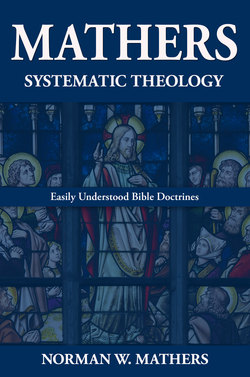Читать книгу Mathers Systematic Theology - Norman W. Mathers - Страница 30
3.4.1.3 The Immutability of God
ОглавлениеGod is immutable in His person and character (attributes) (Hodge 1975:1:390). The New Testament epistle of James records God’s immutability (James 1:17). Immutability means that God does not change. Hodge (ibid: 390-391) gives the following scriptures that relate to God’s immutability (Mal. 3:6, Ps. 33:11, Prov. 19:21, Is. 14:24, 46:9-10). Immutability must not be confused with immobility. The critics continue attacking the immutability of God by pointing to passages that declare at least superficially that God changes (Gen. 6:6, Num. 23:19, Jonah 3:10). The Lord must respond to sin. His attributes of holiness and justice are part of God’s character. God interposed with an oath witnessing to his immutability (Heb. 6:17) (Klooster 1975:25 in Henry (ed.) 1975). Klooster defines immutability of God as his constancy and unchangeableness. He cites three areas where this is true. The first is God’s being (substance). The second is His decrees, and the third is God’s works. Decrees should be singular. His works should be understood and referred to as His means to accomplish his works. He clarifies those verses that refer to God’s repentance. 1 Samuel 15:11 records the fact that God repented that he had chosen Saul to be king. The same chapter bears out the words of Samuel that God cannot lie nor repent (1 Sam. 15:28). The immutability and faithfulness of God are evidenced in God’s keeping the covenant. Other passages refer to repentance which are conditional. The condition is either stated or implied (ibid:26). Klooster has in mind Jeremiah 18:8. This explains God’s repentance in the prophecy of Jonah and the response of the Ninevites. The Sovereign God is over all (ibid:26-27). Chafer (1971:1:219) agrees that the repentance of God can be understood by its conditional nature. He calls Jonah 3:4, 10 a threat. It is better explained as God has to respond to sin. God has not nor will he change in any way internally or externally (Hodge 1972:144). The eternal God is infinite. The scripture declares the immutability of God applied to Jesus Christ (Heb. 13:8). Shedd (1979:1:351) advances our discussion by adding that God does not change in his substance (essence- internal being), his attributes or purposes. Conditional promises and threats demand a change in man but not in God (ibid:352-353). He relates God’s immutability to his infinity and infinite knowledge (1 John 3:20, John 21:17, Acts 15:18, Heb. 4:13, Rom. 11:33, Matt. 6:32, 1 Kin. 8:39, Ps. 139:1-16, Is. 46:10, Ezek. 11:5) (ibid:354). Erickson (2000:304) refers to the immutability of God as his constancy. God’s perfection is that He is a perfect being. His constancy is seen in his plans and purpose. There is not any modification in God’s character. God is immutable in his character. The faithfulness of God is a constant throughout the scriptures (1 Cor. 1:9, Phil. 1:6, 2 Tim. 2:13) (ibid:317). Scripture declaring a change in the mind of God are to be understood as a further outworking of his plan. Erickson gives the example of the Gentiles (ibid:304). I might add that any apparent change in the character of God such as God repents must be understood as a response to sin. Process theologians contradict the immutability of God arguing for reality to be seen in terms of the process (ibid:305). At best, it can be added that process theology is a philosophical position without a biblical foundation. Erickson informs that two names associated with process theology are Charles Hartshorne and Alfred North Whitehead (ibid:305). Some theists have challenged immutability, and additional attributes such as timelessnesss, and foreknowledge. They claim that these attributes originate with Greek philosophy rather than the scriptures (ibid:307). Timelessness relates to God’s attribute of eternity. Erickson (2000:307) names Clark Pinnock, Richard Rice, John Sanders, William Hasker, and David Basinger as arguing for this idea. God is both unchangeable and unchanging in his character (attributes) (Ryrie 1974:23). There is not any development needed nor is necessary in God’s essence. The plans of God are immutable as is He (ibid:23-24). God’s revelation is progressive in nature. The canon closed at approximately 100 A.D. The last New Testament book to be received was the book of Revelation at 90 A.D. This apparent change is only from man’s perspective. Revelation was not given all at once but over a course of approximately 1600 years (Chafer 1971:1:29). Secular thought claims immutability can be explained as originating with mysticism and apriori theology. This view faults Scripture and is speculative in nature (MacIntosh 1919). Cupitt (2003:4) believes that objective theism of which immutability is one attribute of God is not defensible. He argues that this is true ethically, philosophically, theologically, and culturally. He omits the biblical category.
